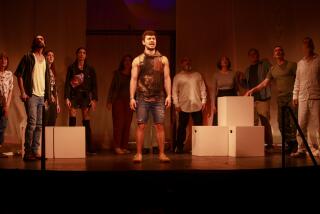UCLA SCREENS CORTI-TROLLER TRILOGY
The UCLA Film Archives’ Jewish Film Festival starts Saturday in Melnitz Theater with director Axel Corti and writer Georg Stefan Troller’s superb six-hour trilogy “Where To and Back.” The first part, “God Does Not Believe in Us Anymore,” screens at 8 p.m., followed by “Santa Fe” at about 10 p.m. On Aug. 15, “Santa Fe” has a repeat showing at 8, followed by “Welcome in Vienna.” Clearly drawn from Troller’s own experiences, the trilogy unfolds as a great odyssey, spanning the years 1938 to 1945, in which an Austrian Jewish youth’s struggle for survival gives way to another, somewhat older Viennese Jew’s quest for identity.
Part I is a suspense-ridden adventure in which its teen-age hero, Ferry Tobler (Johannes Silberschneider), after the fall of Austria, makes his perilous way to Czechoslovakia and then to France, desperate to escape the Nazis. Part II introduces us to Freddy Wolff (Gabriel Barylli) as he arrives in New York and becomes a part of the Jewish emigre community in that tense period between the outbreak of World War II and Pearl Harbor. In Part III we follow Freddy, now an American soldier (rather than the Santa Fe cowboy he dreamed of becoming), back to Austria as the war draws to a close and occupation begins. We experience the evil shadow of the Third Reich spreading over Europe like a disease, then New York as a kind of infernal machine for those Jews lucky enough to escape Hitler, and finally the treacherous, corrupt ambiguity of postwar Austria, eager to sweep away the immediate past yet still afflicted by anti-Semitism. At once intimate and epic and an impeccable period re-creation, “Where To and Back” is a masterpiece shot in gritty black and white and populated by several dozen richly drawn characters. For full schedule: (213) 825-2581.
When Paramount at last passed on Sergei Eisenstein’s ambitious treatment for Theodore Dreiser’s “An American Tragedy,” Josef von Sternberg was asked to film it as quickly and cheaply as possible. The result is a film that is far different in tone from George Stevens’ memorable 1951 version, “A Place in the Sun,” starring Montgomery Clift and Elizabeth Taylor. Sternberg’s approach is as briskly realistic as Stevens’ was grandly romantic. Sternberg and adapter Samuel Hoffenstein emphasize the mundane affair between their weak, callow hero (Phillips Holmes) with a factory worker (Sylvia Sidney, pretty and far from the frump Shelley Winters was to make her) rather than his subsequent romance with a local society beauty (Frances Dee). In never asking for sympathy for Holmes’ hapless Clyde Griffiths, Sternberg actually elicits more compassion for him than Stevens and Clift did. Unfortunately, “An American Tragedy,” which was photographed with a fatalistic play of light and shadow by Lee Garmes, lapses into a tediously bombastic courtroom melodrama, but even so it reveals Sternberg’s characteristically clear-eyed view of human nature and conception of women as femmes fatales. “An American Tragedy” (1931) screens Friday at the County Museum of Art’s Bing Theater following the 1 p.m. screening of “A Farewell to Arms” (1932). For this week’s schedule of the musem’s Paramount retrospective: (213) 857-6010. For UCLA’s Paramount offerings: (213) 825-2581.
Allan Holzman, a young director moving up the ranks of exploitation pictures, for the moment has departed from the likes of “Grunt!: The Wrestling Movie” and “Programmed to Kill” to make “No Words to Say,” a warm, encouraging and enlightening 55-minute documentary on the plight of stutterers. The film focuses on the work of Vivian Sheehan, who continues the speech therapy program she and her late husband, Joseph, founded at UCLA in 1949. Sheehan’s technique is to teach stutterers how to “slide” with difficult words rather than to avoid them, and her results border on the miraculous. Holzman had a vested interest in making “No Words to Say,” for he is himself a graduate of Sheehan’s course. “No Words to Say” screens tonight and Tuesday at 8 p.m at EZTV, 8547 Santa Monica Blvd. (213) 657-5772.
More to Read
Only good movies
Get the Indie Focus newsletter, Mark Olsen's weekly guide to the world of cinema.
You may occasionally receive promotional content from the Los Angeles Times.










